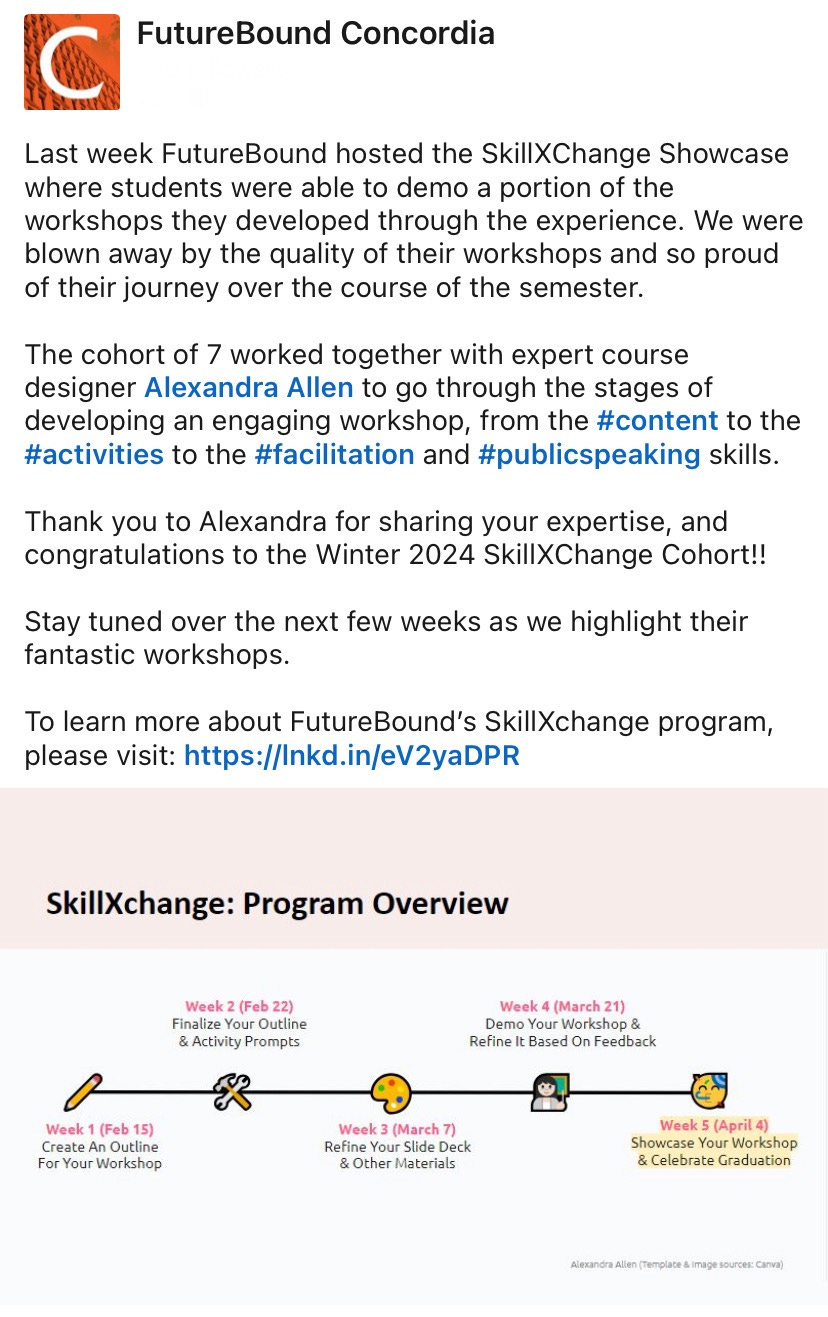Create Career Assets
What solopreneurship taught me about scaling (and avoiding burnout)
Hey, it’s Alexandra. Welcome to my weekly newsletter where I share my latest reflections on professional development and well-being.
If you’re not a subscriber, here’s what you missed recently:
Subscribe to get future posts emailed to you:
This week, I share reflections on:
Creating Career Assets
Leveraging Assets For Impact
The Beauty of Compounding Assets
☕️ Read time: 5 mins (best with tea or coffee)
The best investment I made during my solopreneur era from 2021 to 2023 was creating career assets that could compound in value over time.
I began my self-employment journey by freelancing with my favourite startups. But I quickly realized my intentions for venturing out on my own—to maximize my freedom and continuous learning—weren’t being met.
I was learning a ton but lacked the freedom to design the programs, courses, and workshops I felt compelled to create. Plus I was still trading my time for money.
I needed a way to scale.
But without the desire to build a team on my own, I realized career assets were the obvious answer.
Creating Career Assets
My motivation to create career assets was sparked by two reflection prompts:
What questions do I find myself answering over and over again?
How might I answer those questions in more fun, scalable ways?
I realized the questions consuming most of my energy were in the realm of “course and workshop creation 101.” Therefore, the best way to serve others while safeguarding my time was to create “how-to” resources in the form of:
Each of these resources required different levels of energy to create and sustain and by experimenting, I managed to diversify my “portfolio.”
Here’s a high-level overview of how I classify career assets:
Now, on to how to leverage assets to create an impact.
Leveraging Assets For Impact
In January, a local university I’ve worked with for the past four years pitched me on creating a new program called SkillXchange.
The goal was to facilitate “students teaching students” by helping high-calibre students create workshops for their peers. But the team mandating the program needed someone like me—with expertise in workshop design and training—to get students from 0 to 1.
Under normal circumstances, I would’ve had to decline their offer. Because having shifted out of solopreneurship and back to nine-to-five-ing in November, I was fresh into a new job and giving it my undivided attention.
Plus I was finally back to working a healthy schedule after grinding like the bionic woman since 2020—when the online course world exploded with opportunities.
It took me burning out last summer to realize I could no longer operate at the speed and intensity I’d taken on since the pandemic. (Hence why I joke I’m a “recovering solopreneur now working in wellness.”)
My point is, when it came to evaluating the opportunity around SkillXchange, my first thoughts were “I’d love to help. But I’m not taking on extra work. My days of working nights and weekends are behind me.”
But here’s where things got interesting.
I had already created an asset I could offer the university for the program—which in this case was a pre-existing module of a broader course I had launched one year prior, in January 2023.
All I had to do was repurpose that module—on workshop design and delivery—into a standalone program, which I was able to do in a few hours over a single weekend.
Aside from that, the time commitment on my end was a mere ten hours spread over two months. I would meet the students for four two-hour coaching sessions every other Thursday night (through a mix of virtual and in-person sessions), and then we’d conclude with a showcase where students could demo their workshops for invited guests.
But thanks to the program content I had already created, students could do 90% of the work at their own pace and in their own time—and the university would manage the operations.
My Impact
I was honoured to convert part of my course into the SkillXchange program for two reasons. Firstly, I know what a valuable skillset designing and delivering workshops provides you with.
You become a sharper operator who can:
Structure and facilitate outcome-driven projects and meetings
Organize interactive activities and lead fruitful discussions
Manage time better and explain things clearly to others
Strike a balance between preparation and presence
Be creative and have fun while making ideas stick
Being an expert in your domain isn’t enough to be a top performer anymore. You also need soft skills to articulate your points of view, advance your agenda, and ultimately, lead teams through clear inspired action.
By learning how to run engaging workshops, you naturally develop these skills and make knowledge transfer scalable within your team.
That’s a HUGE advantage.
As I told the students, I wish the university had offered these types of programs when I was a student from 2009 to 2012. They would’ve served me tremendously early in my career.
Secondly, I wanted to support the program given its equitable nature.
In a forward-thinking move, the university had acquired funding to provide students selected for the program with an honorarium for their participation.
As someone who worked throughout university (in a cafe), I would’ve loved to have been paid to learn practical skills for the workplace.
There’s unquestionably a Grand Canyon-sized gap between the opportunities afforded to students who have to work versus those who don’t so I was keen to contribute to this initiative aimed at bridging it.
The result?
Here’s what the university’s student success centre shared post-showcase:
I was blown away to see students’ ideas go from loosely described in a Typeform survey to impactful hands-on learning experiences in a matter of weeks.
Topics ranged from prioritizing your mental health as a student to leveraging musician techniques to enhance public speaking, how to start a student club, Digital Marketing 101, using Emotional Intelligence to network better, connecting with your inner-self, and how to start a YouTube channel.
I learned a ton in the process and funnily enough, when the students expressed how learning about each other’s topics was a massive side benefit, I concurred that learning from other people’s expertise is a big reason I love helping people create courses and workshops.
I’m proud of all the students and excited for them to scale their impact exponentially over time.
The Beauty of Compounding Assets
As much as my solopreneur era was wild and at times exhausting, I had a blast working on the programs, courses, and workshops I took on.
So it’s heartwarming to see my “how-to” assets continue to deliver returns.
It’s a funny and delightful feeling to not have to push my assets or dedicate time to delivering them anew—which is completely disproportionate to the efforts that went into creating them.
My assets were built through the compounding knowledge and experience I gained over weeks, months, and years (with plenty of iterative practice).
So I can’t overemphasize how rewarding it is when strangers on the Internet message me to share how valuable they find one of my posts, frameworks, or tutorials.
Many of these messages lead to brilliant new connections.
My question to you is, what assets can you create?
Thanks for reading and have a wonder-full week,
💛 Like or comment if you enjoyed this edition.
☕️ Reach out to grab coffee or tea in Montreal.




This is great, Alexandra. Assets sounds like such a perfunctory way to describe the incredible amount of value, personality and skill you've imparted in what you've created.
But I do like the simplicity of assets generating surprising returns. I'm so glad you're still putting smiles on people's faces by teaching them how to share their own assets. Love this!
This is such a great idea! Where do you house your assets? Is it on an About page somewhere or a Gumroad?